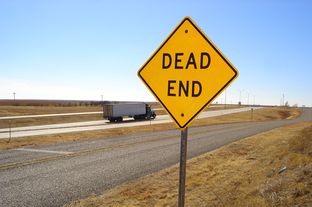A Dead End for Road Funding?

[Editor's note: Gov. Rick Perry added transportation funding to the special session agenda in the hopes that lawmakers can do in the next few days what they were unable to do in the regular session: Find a way to finance transportation projects with no new taxes or fees.]
This year’s regular legislative session kicked off with Texas lawmakers focusing on three funding priorities: schools, water and transportation.
By Sine Die, public education and water advocates were pretty pleased. Schools got $4 billion more beyond enrollment growth, restoring much of the funding cut from their budgets in 2011. If voters approve the creation of a new fund in November, water infrastructure will get $2 billion.
Transportation boosters, however, were left feeling pretty miserable. The Texas Department of Transportation got $400 million in additional money for the state highway fund, a paltry 5 percent of what the agency had said it needed just to maintain current road congestion.
Now lawmakers are in special session, where Gov. Rick Perry can add whatever he wants to the agenda. So far, he’s sticking with redistricting, but various officials and groups hope that will change. As of Wednesday, 60 bills had been filed, most unrelated to redistricting. Of those (so far) noneligible bills, more are related to transportation than any other topic.
Despite the renewed push for finding money for roads, Perry’s recent comments on his special session plans suggest it isn’t on his radar.
“We’re not going to be adding things to the call just for the sake of adding things to the call,” Perry said. “We want to be relatively assured that we’re going to be successful.”
The chances for any transportation funding proposal in a special session are mixed at best. As the regular session made clear, each option faces a key roadblock:
- 100-year bonds: Perry backed this idea in April, arguing that the state should take advantage of historically low interest rates. It has gained little traction as a large contingent of Republicans remains adamantly opposed to TxDOT assuming any more debt.
- Fee increases: A nonstarter in the House, even without the governor's threat to veto a budget that included any such measures.
- Dedicating future increases in vehicle sales tax revenue to roads: This proposal, from Senate Transportation Chairman Robert Nichols, R-Jacksonville, has backers in both parties and both chambers. Perry likes it too. Yet the Senate’s chief budget writer, Tommy Williams, R-The Woodlands, came out strongly against it, calling it a future budgeting nightmare and “the mother of all dedicated accounts.” That sapped much of its momentum.
- A one-time infusion from the Rainy Day Fund: Given that tapping the fund for $2 billion in water projects turned out to be tougher than budget leaders had expected, this idea has lost its luster.
Williams and Nichols have now floated a new idea: diverting half of the revenue stream currently dedicated to the Rainy Day Fund to roads. Williams said the plan could mean nearly $1 billion a year to the highway fund, and maybe more than that later on if the oil boom expands.
Williams, who said the proposal would ensure a robust Rainy Day Fund even with the diversion, has expressed hope that Perry will add it to the special session call.
Perry is holding his cards close to his chest, but he may find the plan conflicts with his support for keeping the Rainy Day Fund flush and growing to maintain the state’s strong credit ratings.
It’s hard to see how the Nichols/Williams proposal, or any other one to fund roads, would meet Perry’s interest in being “relatively assured” of success, but he is apparently hopeful enough: He added the issue to the special session agenda.

